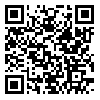مجله رویش روانشناسی از دادن گواهیهای کاغذی معذور است. لطفا تقاضا نکنید. همه گواهی ها در صفحه شخصی کاربران موجود است.
year 14, Issue 7 (Autumn1 2025 2025)
Rooyesh 2025, 14(7): 231-240 |
Back to browse issues page
Download citation:
BibTeX | RIS | EndNote | Medlars | ProCite | Reference Manager | RefWorks
Send citation to:



BibTeX | RIS | EndNote | Medlars | ProCite | Reference Manager | RefWorks
Send citation to:
Vakili N, Amidimehr A, Mehravaran P. (2025). The Effectiveness of Emotion Regulation Training on Lawbreaking and Moral Disengagement in Adolescents with Cyberbullying Behavior. Rooyesh. 14(7), 231-240.
URL: http://frooyesh.ir/article-1-6543-en.html
URL: http://frooyesh.ir/article-1-6543-en.html
1- Master's degree, Department of Psychology, Saveh Branch, Islamic Azad University, Saveh, Iran.
2- Department of Criminal Law and Criminology, Semnan Branch, Islamic Azad University, Semnan, Iran. ,Amir.amidimehrlawyer@gmail.com
3- Master's degree, Department of Psychology, Qom Branch, Islamic Azad University, Qom, Iran.
2- Department of Criminal Law and Criminology, Semnan Branch, Islamic Azad University, Semnan, Iran. ,
3- Master's degree, Department of Psychology, Qom Branch, Islamic Azad University, Qom, Iran.
Abstract: (807 Views)
The present study aimed to determine the effectiveness of emotion regulation training on lawlessness and moral disengagement among adolescents involved in cyberbullying. The research method was a quasi-experimental design with a pretest–posttest and control group. The statistical population included high school students (second cycle) in Karaj during the 2024–2025 academic year. Accordingly, 30 students were purposefully selected and assigned to two groups (15 in the experimental group and 15 in the control group). To measure the research variables, the following instruments were used: the Cyberbullying and Victimization Questionnaire (CBVEQ; Antoniadou et al., 2016), the Tendency toward Lawbreaking Questionnaire (QATLB; Khodayari et al., 2017), and the Moral Disengagement Scale (MDS; Bandura et al., 1996). The experimental group received eight sessions of emotion regulation training, after which both groups completed the posttest. Data analysis was performed using multivariate analysis of covariance (MANCOVA). The results indicated that, after controlling for the effect of the pretest, there was a significant difference between the posttest means of lawlessness and moral disengagement in the experimental and control groups (p < 0.01). Therefore, it can be concluded that this type of training has a considerable impact on reducing lawlessness and moral disengagement among adolescents involved in cyberbullying.
Type of Article: Research |
Subject:
General Psychology
Received: 2025/09/4 | Accepted: 2025/09/20 | ePublished: 2025/10/2
Received: 2025/09/4 | Accepted: 2025/09/20 | ePublished: 2025/10/2
Send email to the article author
| Rights and permissions | |
 |
This work is licensed under a Creative Commons Attribution-NonCommercial 4.0 International License. |





